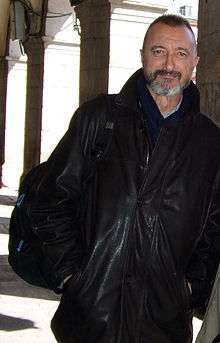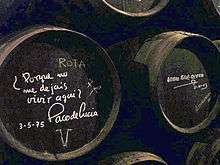Arturo Pérez-Reverte
| Arturo Pérez-Reverte | |
|---|---|
 | |
| Born |
Arturo Pérez-Reverte Gutiérrez 25 November 1951 Cartagena (Murcia), Spain |
| Occupation | Journalist, novelist |
| Language | Spanish |
| Nationality | Spanish |
| Genre | Historical novel |
| Notable works | The Adventures of Captain Alatriste |
| Website | |
|
www | |
Arturo Pérez-Reverte Gutiérrez (born 25 November 1951 in Cartagena) is a Spanish novelist and journalist. He worked as a war correspondent for RTVE and was a war correspondent for 21 years (1973–1994). His first novel, El húsar, set in the Napoleonic Wars, was released in 1986. He is well known outside Spain for his "Alatriste" series of novels. He is now a member of the Royal Spanish Academy, a position he has held since 12 June 2003.
Writing
Pérez-Reverte's novels are usually centered on one strongly defined character, and his plots move along swiftly, often featuring a narrator who is part of the story but apart from it. Most of his novels take place in Spain or around the Mediterranean, and often draw on numerous references to Spanish history, colonial past, art and culture, ancient treasures and the sea. The novels frequently deal with some of the major issues of modern Spain such as drug trafficking or the relationship of religion and politics.
Often, Pérez-Reverte's novels have two plots running in parallel with very little connection between them except for shared characters. For example, in The Club Dumas, the protagonist is searching the world for a lost book and keeps meeting people who parallel figures from Dumas novels; the movie made from it, The Ninth Gate, did not feature the Dumas connection with no loss of narrative momentum. In The Flanders Panel, a contemporary serial killer is juxtaposed with the mystery of a 500-year-old assassination.
In his often polemical newspaper columns and the main characters of his novels, Pérez-Reverte often displays pessimism about human behaviour, shaped by his wartime experiences in places like El Salvador, Croatia or Bosnia[1] and his research for crime shows.
Throughout his career, and especially in its latter half, he has been notorious for cultivating his now trademark maverick, non-partisan and at times abrasive persona. This has occasionally been a source of conflict with more sectarian journalists and writers.[2] He originally refused to have his novels translated from the original Spanish to any language other than French. However, English translations were eventually made available for some of his works, and most of his work is also available in Portuguese.
Pérez-Reverte was elected to seat T of the Real Academia Española on 23 January 2003, he took up his seat on 12 June 2003.[3]
In May 2011 the Audiencia Provincial of Madrid ordered Pérez-Reverte and Manuel Palacios, director and coauthor of the film Gitano to pay 80,000 Euros to the film maker Antonio González-Vigil who had sued them for alleged plagiarism of the film's script, a decision Pérez-Reverte described as "a clear ambush" and a "clear manoeuvre to extort money."[4] The ruling contradicted two previous criminal rulings and one from a merchant judiciary which had supported Pérez-Reverte and Palacios. In July 2013 the Audiencia Provincial of Madrid ordered Pérez-Reverte to pay 200,000 euros to González-Vigil for plagiarism.[5]
Awards and recognition
- The Painter of Battles was the winner of the 2008 Premio Gregor von Rezzori award for foreign fiction translated into Italian.
Personal life

Pérez-Reverte started his journalistic career writing for the now-defunct newspaper Pueblo and then for Televisión Española (the Spanish state-owned television), often as a war correspondent. Becoming weary of the internal affairs at TVE, he resigned as a journalist and decided to work full-time as a writer.
His teenage daughter Carlota was billed as a co-author of his first Alatriste novel.[6] He lives between La Navata (near Madrid) and his native Cartagena, from where he enjoys sailing solo in the Mediterranean. He is a friend of Javier Marías, who presented Pérez-Reverte with the title of Duke of Corso of the Kingdom of Redonda micro nation.
His nephew Arturo Juan Pérez-Reverte is a professional footballer playing for FC Cartagena.[7]
Controversies
Mexican novelist Verónica Murguía accused Arturo Pérez-Reverte of plagiarizing from her work. On 10 November 1997 Murguía published a short, "Historia de Sami", in the magazine El laberinto urbano. Months later, in March 1998, Pérez-Reverte published a story in El Semanal, with the title "Un chucho mejicano", bearing close similarities in narration, chronology, phrases, and in the anecdote. Pérez-Reverte's story was recently republished in a re-compilation for the text "Perros e hijos de perra" (Alfaguara), and it was then that Murguía noticed the plagiarism. Murguía will not proceed with a legal case but asked for an apology and the removal of the story from his text. Meanwhile, Pérez-Reverte apologized and noted that the story he published he wrote exactly as it was told to him by writer Sealtiel Alatriste.[8]
Pérez-Reverte's script for the film Gitano in the late 1990s also brought a case of plagiarism against the author, of which he was exonerated several times. However, Pérez-Reverte still had to pay 212,000 euros when the Audiencia Provincial de Madrid accepted an appeal by the plaintiff.[8]
Bibliography
Captain Alatriste novels
- El capitán Alatriste (1996; tr: Captain Alatriste, Plume 2005, ISBN 978-0452287112), presenting the character of a swordsman in the Spanish Golden Century.
- Limpieza de sangre (1997; tr: Purity of Blood), about the "purity of blood" demanded from Conversos.
- El sol de Breda (1998; tr: The Sun over Breda), about the war in the Spanish Netherlands – specifically, the Siege of Breda.
- El oro del rey (2000; tr: The King's Gold), about the Spanish treasure fleet.
- El caballero del jubón amarillo (2003; tr: The Cavalier in the Yellow Doublet). Alatriste clashes with king Philip IV of Spain.
- Corsarios de Levante (2006; tr. Pirates of the Levant). Alatriste fights Barbary pirates.
- El puente de los Asesinos (2011). Alatriste tries to kill the Doge of Venice.
Other novels
- El húsar (1986). Set in the Napoleonic age.
- El maestro de esgrima (1988; tr: The Fencing Master, Mariner Books, 2004. ISBN 978-0156029834). A lady requests lessons from a fencing master.
- La tabla de Flandes (1990; tr: The Flanders Panel). About a mysterious Flemish painting.
- El club Dumas or La sombra de Richelieu (1993; tr: The Club Dumas ISBN 978-0156032834). A cult of followers of the novels of Alexandre Dumas.
- La sombra del águila (1993). Set in the Napoleonic age.
- Territorio comanche (1994). A novelization of his Balkan war experience.
- La piel del tambor (1995; tr: The Seville Communion)
- Un asunto de honor (1995)
- La carta esférica (2000; tr: The Nautical Chart).
- La Reina del Sur (2002; tr: The Queen of the South ISBN 978-0452286542). Story of a Mexican woman who becomes a leader of a drug trafficking gang in the south of Spain.
- Cabo Trafalgar (2004), about the battle of Trafalgar.
- El pintor de batallas (2006; tr: The Painter of Battles). A retired war photographer confronts his past.
- Un día de cólera (2007). 2 May 1808. The battle in Madrid against the French army for independence, hour to hour.
- Ojos azules (2009). Spanish soldiers flee the Aztecs.
- El Asedio (2010; tr The Siege by Frank Wynne). Set in 1811, during the siege of Cádiz.
- El tango de la guardia vieja (2012). Romance.
- El francotirador paciente (2013). A graffiti painter.
- Hombres buenos (2015) About the Royal Spanish Academy and the Encyclopédie
- Falcó (2016) Falcó is an espionage agent working for Franco during the Spanish Civil War.
Non-fiction
- Obra breve (1995)
- Patente de corso (1998). Collection of press columns.
- Con ánimo de ofender (2001). Further columns.
- No me cogeréis vivo (2005)
- Cuando éramos honrados mercenarios (2009)
Films based on novels by Pérez-Reverte
- El maestro de esgrima (1992) (based on The Fencing Master)
- Uncovered (1994) (based on The Flanders Panel)
- Cachito (1995) (based on Un Asunto de Honor)
- Territorio Comanche (1997)
- The Ninth Gate, by Roman Polanski (1999) (very loosely based on El club Dumas)
- The Road to Santiago (1999), Spanish television miniseries (story)
- Alatriste (2006) (based on the series Captain Alatriste)
- The Nautical Chart (2007) (based on La Carta Esférica and starring Aitana Sánchez-Gijón)
- Quart: El Hombre de Roma (2007), Spanish television miniseries based on The Seville Communion
- La Reina Del Sur (2011), Spanish Novela (Soap Opera) airing on Telemundo
See also
- Captain Alatriste (the books)
- Alatriste (the film)
- Café Gijón (Madrid)
References
- ↑ His weekly column for 10 June 2007 explains why he avoids reminiscing about the Bosnian War
- ↑
- ↑ "Arturo Pérez-Reverte Gutiérrez" (in Spanish). Real Academia Española. Archived from the original on 27 September 2015. Retrieved 14 April 2016.
- ↑ El escritor Arturo Pérez-Reverte, condenado a pagar 80.000 euros por plagio, note from EFE, reproduced in El País digital 6 May 2011, accessed 22 October 2011
- ↑ El Correo Arturo Pérez-Reverte paga más de 200.000 euros por el plagio de un guión 16 July, 2013
- ↑ El capitán Alatriste; Arturo y Carlota Pérez-Reverte
- ↑ "El Alatriste de La Mancha" [The Alatriste of La Mancha] (in Spanish). Marca. 27 September 2013. Retrieved 29 May 2017.
- 1 2 "Archived copy". Archived from the original on 31 March 2015. Retrieved 2015-03-20.
External links
| Wikimedia Commons has media related to Arturo Pérez-Reverte. |
 Spanish Wikiquote has quotations related to: Arturo Pérez-Reverte
Spanish Wikiquote has quotations related to: Arturo Pérez-Reverte- Official website (in Spanish)
- iCorso (in Spanish)
- Arturo Pérez-Reverte on IMDb
- Capitan-Alatriste.com, fan site with an English language section
- Unofficial website (very outdated)